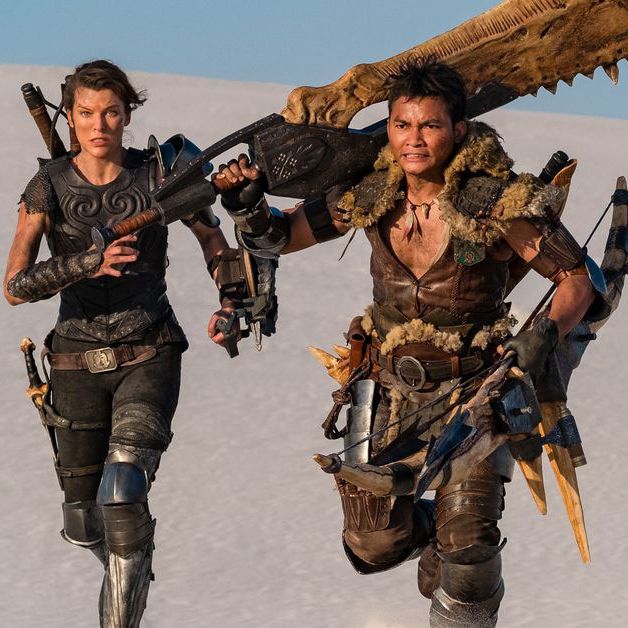
Paul W.S. Anderson is the rare director who seems to make good movies out of video games, with Mortal Kombat, the Resident Evil series, and now Monster Hunter on his résumé. Each of these adaptations is quite different (and some are better than others), but if there’s one thing that seems to unite the pictures, and Anderson’s work in general, it has to be his attention to the environments in which the action takes place; he’s the most architectural of genre filmmakers. His first feature, the controversial indie British drama Shopping, introduced the world to Jude Law as a nihilistic young hood who got his kicks crashing cars into shopping malls. In the two films that followed, Mortal Kombat and Event Horizon, location became even more critical — particularly in the latter, a horror-sci-fi masterpiece about a spaceship that had gone quite literally to hell and back, in which the ship, a cross between space station and medieval torture chamber, was arguably the central character.
All of this makes Anderson an ideal director for video-game adaptations, because more than action — which, admittedly, he’s quite deft at — the chief appeal of so many games seems to be the ability to both use and lose oneself in their often-otherworldly environments. Monster Hunter — which takes place in a fantastical dimension in which lowly humans are pitted against a variety of humongous, surreal, terrifying creatures — was partly shot on a striking lunar-landscape stretch of desert in Namibia, and it does feel like we’ve been transported somewhere not of this Earth. (The director has the good sense to kick the film off with one of its most striking images: a giant ship sailing through an ocean of sand, rising and falling and crashing with the rolling dunes.)
The “Wizard of Oz meets Hell in the Pacific” story follows Artemis (Milla Jovovich), an Army Ranger whose team was swept into this world through a kind of storm portal, and a character known as the Hunter (Tony Jaa), an inhabitant of this land who has been trapped in a desolate stretch of desert after getting swept off one of those aforementioned sand ships. Artemis and the Hunter don’t speak each other’s language, so pretty much all of their communication happens through gestures and glances. They also start off as adversaries, and only begrudgingly ally themselves against the armies of giant spiders and the huge horned underground worm-demons and the fire-breathing armored dragons and whatnot. A proud schlockmeister, Anderson doesn’t play coy or get too subtle with the creatures here: The movie is called Monster Hunter, after all, and dammit, he’s gonna give us monsters. Not to mention some gnarly weapons, from giant scimitars to flaming swords to retractable, wrist-mounted crossbow thingamabobs. (I assume some of this stuff comes from the game, which I haven’t played.)
Yet, there is art in it, too. There’s something truly electric about the pure, visual storytelling of Monster Hunter. After Artemis discovers, for example, that the giant spiders can’t step out into the sun, a couple of suspense scenes turn on the slow, agonizing appearance and disappearance of sunlight; because we’re so embedded in these characters’ perspectives, their gazes and their movements, the experience of watching them becomes more visceral. This is also where Anderson’s penchant for designing his action scenes around the settings comes in handy. The landscape, with its caves and outcroppings and ledges and canyons and different levels, is filled with dramatic potential. It’s there to be used, not just to be passed through, or to have backstory-filled conversations in.
Admittedly, this won’t be to all tastes. There’s a bluntness to Monster Hunter that may turn off viewers looking for something with more grandeur or refinement or ambition. Anderson has always seemed content with his corner of the genre universe — making loud, ruthless, gleefully violent, jump-scare-filled thrillers and action flicks that some of us find irresistible and others find obnoxious. The PG-13 Monster Hunter has some of the rough trappings of a more family-friendly fantasy entertainment than much of his previous work, but as with his period pieces — the underrated Pompeii and Three Musketeers — the director bends the picture to his charmingly barbaric will, not the other way around. The film even contains one classic cat jump-scare … but the cat in this case turns out to be a muscle-bound feline pirate wielding a knife. Which should give you an idea of the kind of movie this is. Monster Hunter is so unapologetically itself, it warms your heart.
More Movie Reviews
"movie" - Google News
December 19, 2020 at 05:07AM
https://ift.tt/38fI9yc
Monster Hunter Is Loud, Unapologetic Fun - Vulture
"movie" - Google News
https://ift.tt/35pMQUg
https://ift.tt/3fb7bBl
Bagikan Berita Ini














0 Response to "Monster Hunter Is Loud, Unapologetic Fun - Vulture"
Post a Comment